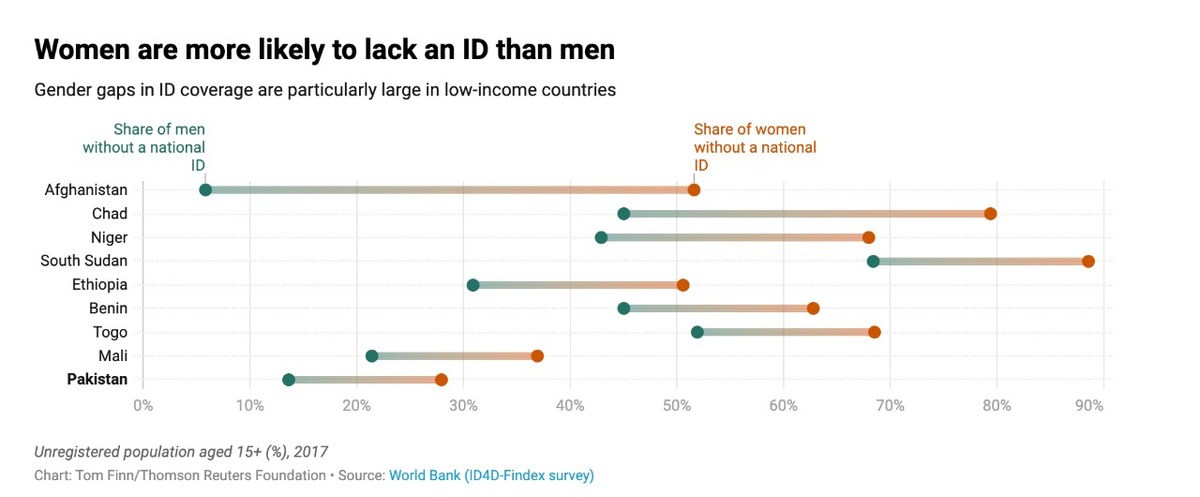LAHORE: After three years of repeated attempts to get her digital national identity card, Rubina — a woman from the Pakistani city of Karachi — decided to take her battle to court, winning a landmark victory.
Until then, Pakistanis had not been able to get the Computerized National Identity Card (CNIC) unless they presented their father’s ID card — an impossibility for many people, including those like Rubina who were raised by single mothers.
The card is vital to vote, access government benefits including public schools and health care, open a bank account or apply for jobs.
“I would turn up there, and be told to bring my father’s card,” said Rubina, 21.
“My mother raised me after my father abandoned us soon after my birth — how could I furnish his identity papers then?”
Rubina’s frustration drove her to file a petition at the high court in Sindh province, which in November ruled that the government agency that oversees the CNIC must issue her a card based on her mother’s citizenship record.
For Rubina, the decision meant she could apply to take over her mother’s job as an attendant in the state education department when her mother retired.
More widely, her case ends the effective exclusion of children of single mothers from the ID card scheme, said Harris Khalique, secretary-general of the Human Rights Commission of Pakistan (HRCP), a non-profit.
“Without a CNIC, neither can any public service be accessed, nor can any banking transaction be conducted,” he told the Thomson Reuters Foundation.
“In short, one has no rights at all as a citizen.”
The agency in charge of the CNIC, the National Database and Registration Authority (NADRA), has said it is striving to reach people who have so far been excluded.
“The government has a clear policy that people who are supposed to be registered in the database will not be excluded,” said Salman Sufi, head of the prime minister’s Strategic Reforms Unit, which oversees the implementation of federal policy.
’LIKE ALIENS’
Established in 2000, NADRA maintains the nation’s biometric database, and says it has issued some 120 million CNICs to 96 percent of adults in the nation of about 212 million people.
Each card comprises a 13-digit unique ID, a photograph of the person, their signature, and a microchip that contains their iris scans and fingerprints.
Yet millions of people in Pakistan, including women, transgender people, migrant workers and nomadic communities are still without a CNIC.
More than 1 billion people globally have no way of proving their identity, according to the World Bank.

While governments across the world are adopting digital ID systems, they say are improving governance, the UN special rapporteur on human rights has said they exclude marginalized groups, and should not be a prerequisite for accessing social protection schemes.
A study of migrant workers in Karachi by HRCP last year showed that women were more likely not to have a CNIC, putting them at risk of destitution if their husband died or left the family.
Children whose parents are not registered are especially vulnerable, as they cannot get birth certificates, and are at greater risk of trafficking and forced labor, HRCP said.
It has recommended more mobile registration units and female staff to help register vulnerable groups, as well as simpler processes and less stringent documentation requirements, which also make it harder for immigrants to apply.
Only half of some 2.8 million Afghan refugees who have lived in Pakistan for decades are registered with the government. There is also a sizable population of unregistered Bengali, Nepali, and Rohingya immigrants in Pakistan.
“A majority of the Bengali-origin Pakistanis do not have CNICs and are living like aliens and illegal migrants in their own country,” Sheikh Feroz, a community leader, told a recent rally to demand CNICs.
NADRA — which has also helped set up digital ID systems in Bangladesh, Kenya and Nigeria — has said it has a dedicated registration department “especially for women, minorities, transgender and unregistered persons.”
The agency said it had several women-only centers, particularly in border provinces, “to overcome the socio-cultural barriers of women hesitating to deal with male staff,” and prioritizes senior citizens and the disabled.
“Everyone will be provided an opportunity to get registered. No group based on their ethnicity, race or religion will be excluded,” said Sufi, from the Strategic Reforms Unit.
DATA THEFT
For those who have a CNIC, privacy violations are a risk.
The CNIC database is accessed by about 300 public and private service providers, from the tax department to the election commission to mobile service providers.
There have been several data breaches, which points to inadequate security, said Nighat Dad, a lawyer and executive director at the Digital Rights Foundation, a non-profit.
“Women often complain of harassment after their personal information is leaked and is weaponized to blackmail them,” she said.
“Since there is no data protection law, there is no accountability even when personal data such as phone numbers are leaked,” she added.
Data breaches that expose personal data are particularly risky for vulnerable groups such as journalists, activists and religious and ethnic minorities, said Haroon Baloch, senior program manager at Bytes for All, a digital rights group.
“Citizens are not aware of the use of their biometric data,” he said. “The personal data attached with the biometric IDs can be misused, with serious privacy implications not just for the individual, but also their family.”
NADRA officials have rejected accusations that the data has been compromised, saying the database has a multi-layer security system “which makes hacking impossible.”
The government will roll out a data privacy policy “very soon,” said Sufi, with adequate safeguards for data protection, and “punishment in case of breach of privacy or data theft.”
For Rubina, who could not even get a COVID-19 vaccine without a CNIC, simply getting the ID is half the battle won.
“I am happy that others will not suffer like me,” she said.




















